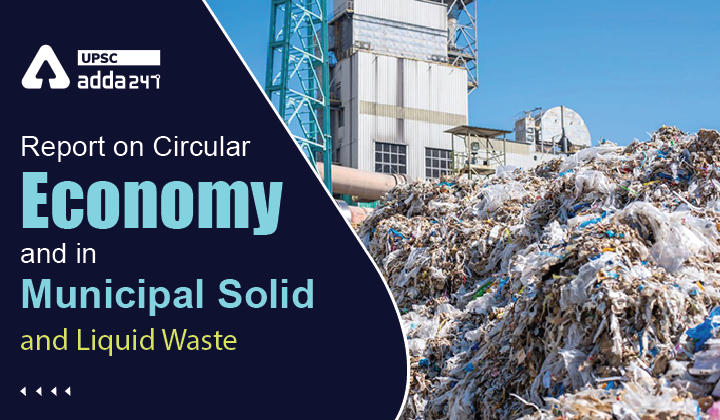Table of Contents
Circular economy UPSC: Relevance
- GS 3: Conservation, environmental pollution and degradation, environmental impact assessment.
Municipal Solid and Liquid Waste: Context
- According to a recently released report on ‘Circular Economy in Municipal Solid and Liquid Waste’, MoHUA (Ministry of Health and Urban Affairs) recommended complete ban on disposing recyclables at landfills.
Report on Circular Economy: Key points
- The report highlighted that disposing of recyclables in landfills/dump sites not only leads to loss of valued resources but also leads to environmental pollution.
- The report has also recommended that state pollution control boards and urban development and industry departments to introduce a tax for dumping of all municipal waste in landfills.
- Moreover, the report was also of the view that the government should reduce the GST and other taxes on products made from recycled materials to 5% to give a boost to waste recycling.
What is circular economy?
- The circular economy is a model of production and consumption, which involves sharing, leasing, reusing, repairing, refurbishing and recycling existing materials and products as long as possible.

Circular economy importance
- Waste management: An efficient waste management ecosystem is necessary to manage the enormous waste generated by renewable energy projects in the coming decades.
- Support to battery industries: The prevalence of a circular economy could also partially insulate battery industries from potential supply chain shocks triggered by extraneous developments.
- Employment opportunities: It would also offer quality employment opportunities for the future generations as new jobs would be created across the entire value chain of waste management and recycling.
- Socio-economic benefits: The majority of India’s recycling sector is informal and workers have to work in unsafe environments without standardised wages. Soo, workers in the informal sector could access various socio-economic benefits and look forward to an improved quality of life.
चक्रीय अर्थव्यवस्था तथा नगरीय ठोस एवं तरल अपशिष्ट पर रिपोर्ट
Circular economy in India: Steps needed
- Revise electronic waste management rules: Policymakers should revise existing electronic waste management rules to bring various clean energy components under their ambit. Moreover, the revised regulations should clearly define the responsibilities of various stakeholders involved in the renewable energy value chain.
- Complete ban on dumping and burning: At present, landfilling is the cheapest and most common practice to manage renewable energy waste, which is not environmentally sustainable. Studies show that the leaching of heavy metals such as lead and cadmium from solar photovoltaic modules could increase by 90% and 40%
- Research and development: The renewable energy industry should invest in the research and development of recycling technologies. Investments in research and development could help discover new ways of recycling that result in higher efficiency and a less environmentally damaging footprint.
- Focus on finance: The focus should be on the creation of innovative financing routes for waste management. The central government should nudge public and private sector banks to charge lower interest rates on loans disbursed for setting up renewable energy waste recycling facilities.
- Quality control standards: Both the Union and State governments should set stringent quality control standards for components used in their tenders. Such standards will prevent premature end-of-life of components, and consequent waste creation.
- Substandard components generate considerable waste due to early life damage that is often irreplaceable, and the components often have to be discarded.
Read current affairs for UPSC




 TSPSC Group 1 Question Paper 2024, Downl...
TSPSC Group 1 Question Paper 2024, Downl...
 TSPSC Group 1 Answer key 2024 Out, Downl...
TSPSC Group 1 Answer key 2024 Out, Downl...
 UPSC Prelims 2024 Question Paper, Downlo...
UPSC Prelims 2024 Question Paper, Downlo...
